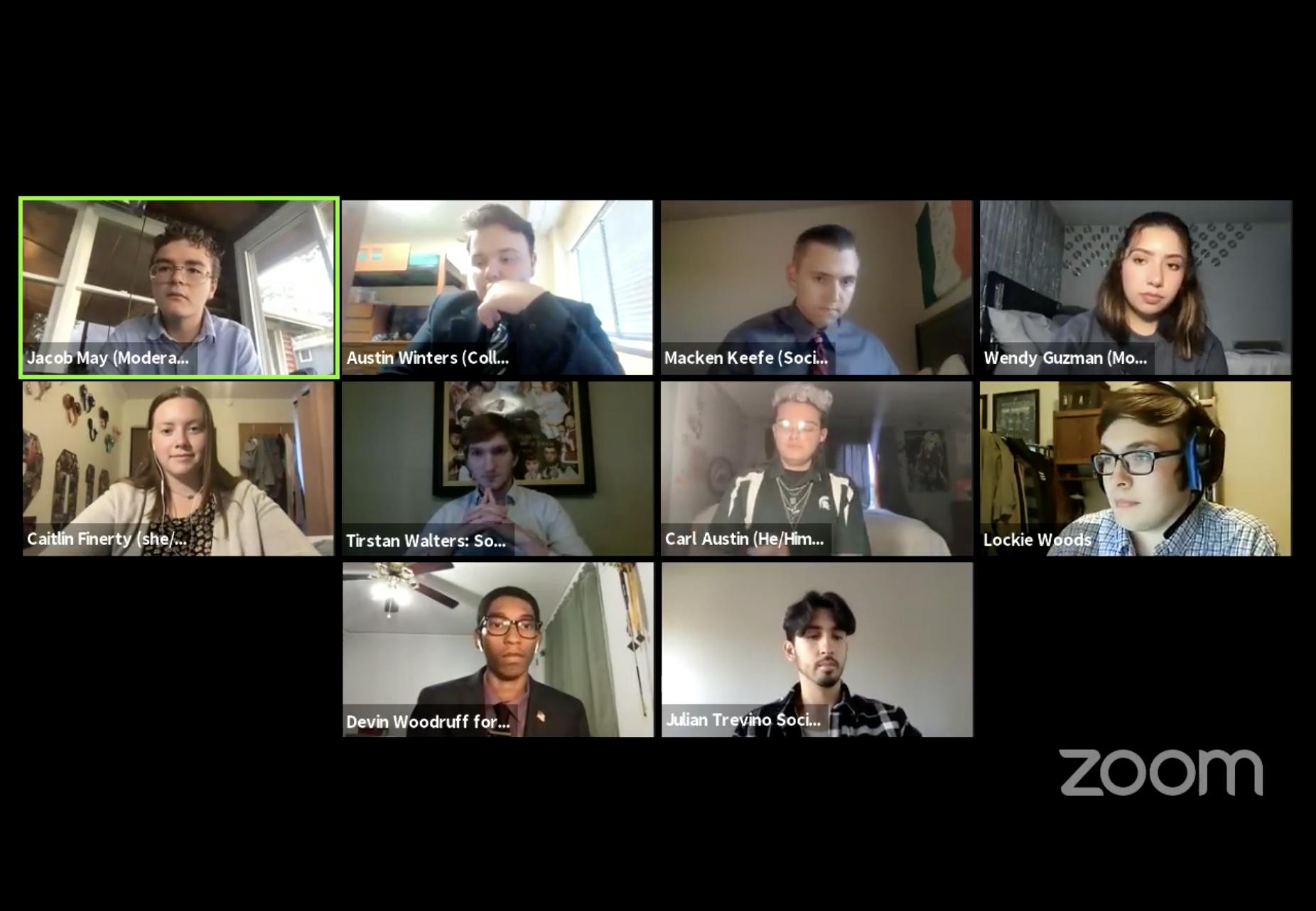An hour before the first presidential debate started Tuesday, a more civilized discussion was wrapping up. In preparation for the Associated Students of Michigan State University, or ASMSU, special fall General Assembly, or GA, election, half of the candidates met to discuss their candidacy and several issues pertaining to the undergraduate population. The election will occur during the week of Oct. 5.
Recap: ASMSU fall election candidates discuss issues

A screenshot from Tuesday's ASMSU roundtable.
The candidates discussed topics including university transparency, the pass/fail option, tuition rates and a safe return to campus.
The following candidates, sorted by college, participated on Tuesday.
- College of Arts and Letters
- Carl Grondin
- College of Communication Arts and Sciences
- Caitlin Finerty
- College of Social Science:
- Lockie Woods
- Macken Keefe
- Julian Trevino
- Devin Woodruff
- Tirstan Walters
- Austin Winters
The discussion was kicked off with a strong statement from Grondin, calling out the university's lack of transparency, which seemed to be a theme of the night's discussion.
"There have been abysmal actions taken on MSU’s campus whether it be from extracurricular activities, certain clubs, administration," Grondin said. "What I want as a representative is to promise full and authentic transparency to my constituents."
Every candidate agreed that students need more help right now in terms of paying for school but offered a wide range of approaches. Finerty suggested a tuition freeze until the 2024-25 school year, while Grondin said students should be demanding a 65% refund in tuition and room and board. Both Walters and Keefe brought up loans, Walters suggesting low or no interest loans and Keefe suggesting that ASMSU should work with CORES & COPS groups to identify and offer unsubsidized loans to at-risk students. Woodruff, Trevino, Winters and Woods all agreed that tuition itself needs to be lowered. Woodruff also suggested that a $50,000 COVID-19 scholarship be created, and Woods claimed that ASMSU should be using money from the suspension of the Safe Ride program to be offering financial assistance to students. Trevino cited that while the university operates like a business, students don't have the same opportunity to recover from financial hardship.
"I do understand that the university would be losing money," Trevino said. "But, I also believe that they have a better opportunity to recover from that in future years, unlike students right now that may have to pay for the same tuition with loss of jobs and family struggles. The university is more of a business, they'll get through it."
On the topic of the pass/fail option, every candidate agreed that the option should be explored in some form. Keefe, however, said that students need to be limited in this option. He said that students need to be kept to a high standard of academics, so proposed that the pass/fail option should be limited to only a small proportion of a student's classes. This led to the only directed disagreement of the discussion.
"I’d like to start by respectfully disagreeing with candidate Keefe, by saying that mental health and mental health issues do not stop after one class of the day," Finerty said. "If you are struggling with your mental health, it’s not going to show up in only one of your classes, it may show up in all of your classes.”
Finerty argued that the option should be available for students to exercise to whatever degree they see fit due to issues of mental health amid the pandemic.
Candidates expressed disappointment in the university's announcement that students will be off-campus this semester, not because of the content of the announcement, but the timing. As far as next semester goes, most of the candidates are leaning towards another online semester, but no matter how the university decides, Woods is looking to them to announce it early.
"I don’t have all the data in front of me that they have access to," Woods said. "I think if they come to the conclusion that they can make it work, they can do so, but they should do it early and they should commit to that plan and stick by it.”
READ MORE
Both Trevino and Grondin agreed that not all students are in ideal situations at home and would advocate for the university to allow each individual student to decide whether or not to return to campus given their situation.
See the full discussion on the State News' Facebook. The other candidates, those from the College of Engineering, Lyman Briggs College and College of Veterinary Medicine, will be meeting on Friday, October 2 at 6:30 p.m. This discussion will also be live-streamed on The State News' Facebook.
Support student media! Please consider donating to The State News and help fund the future of journalism.






